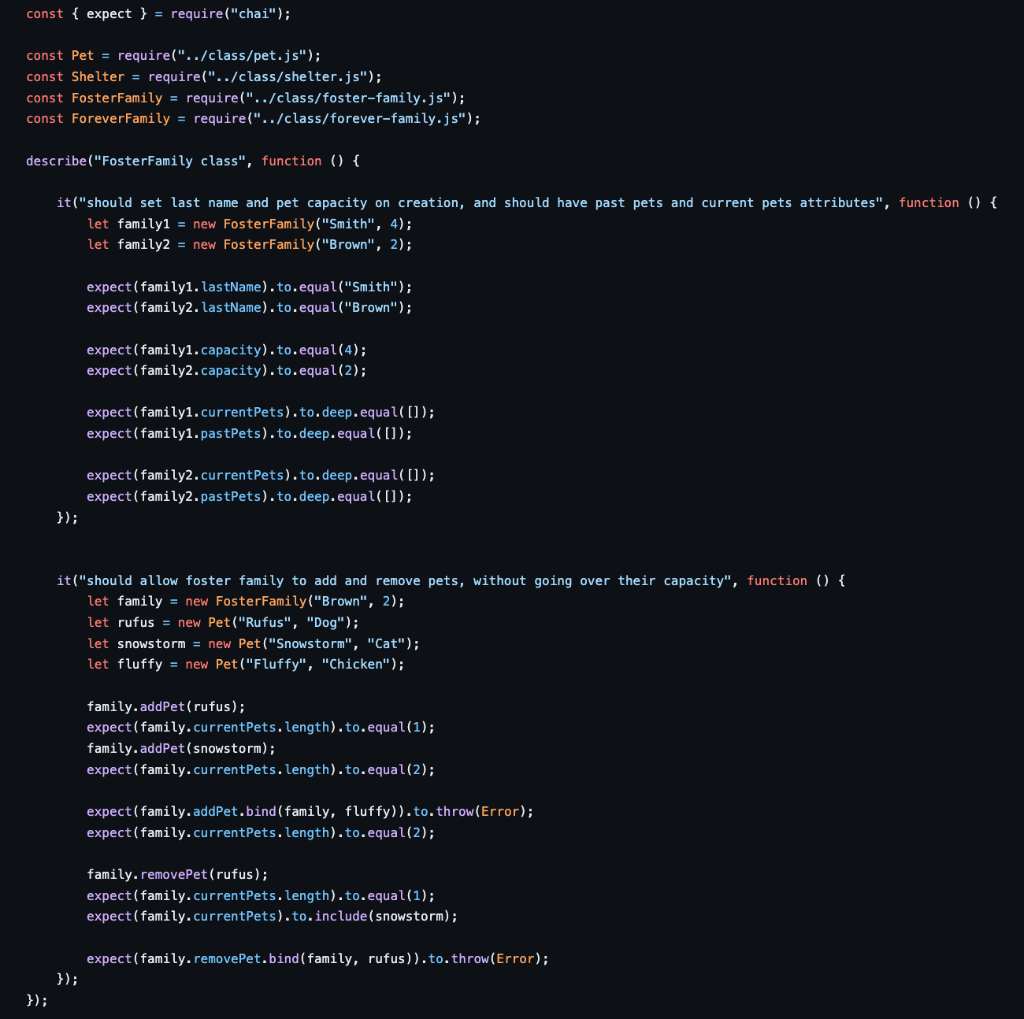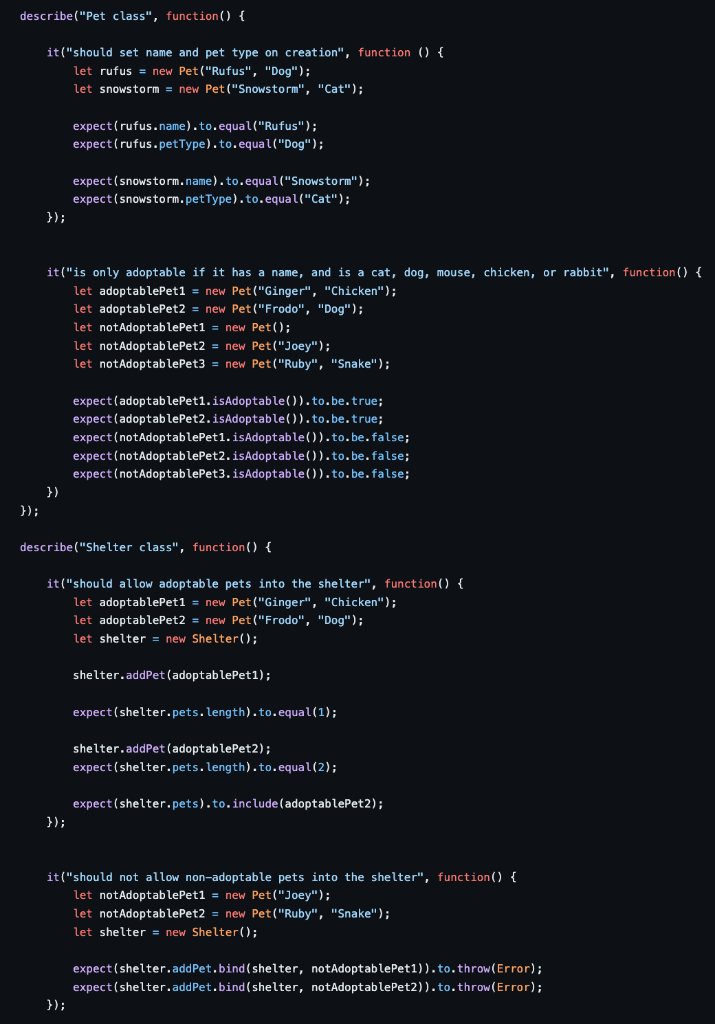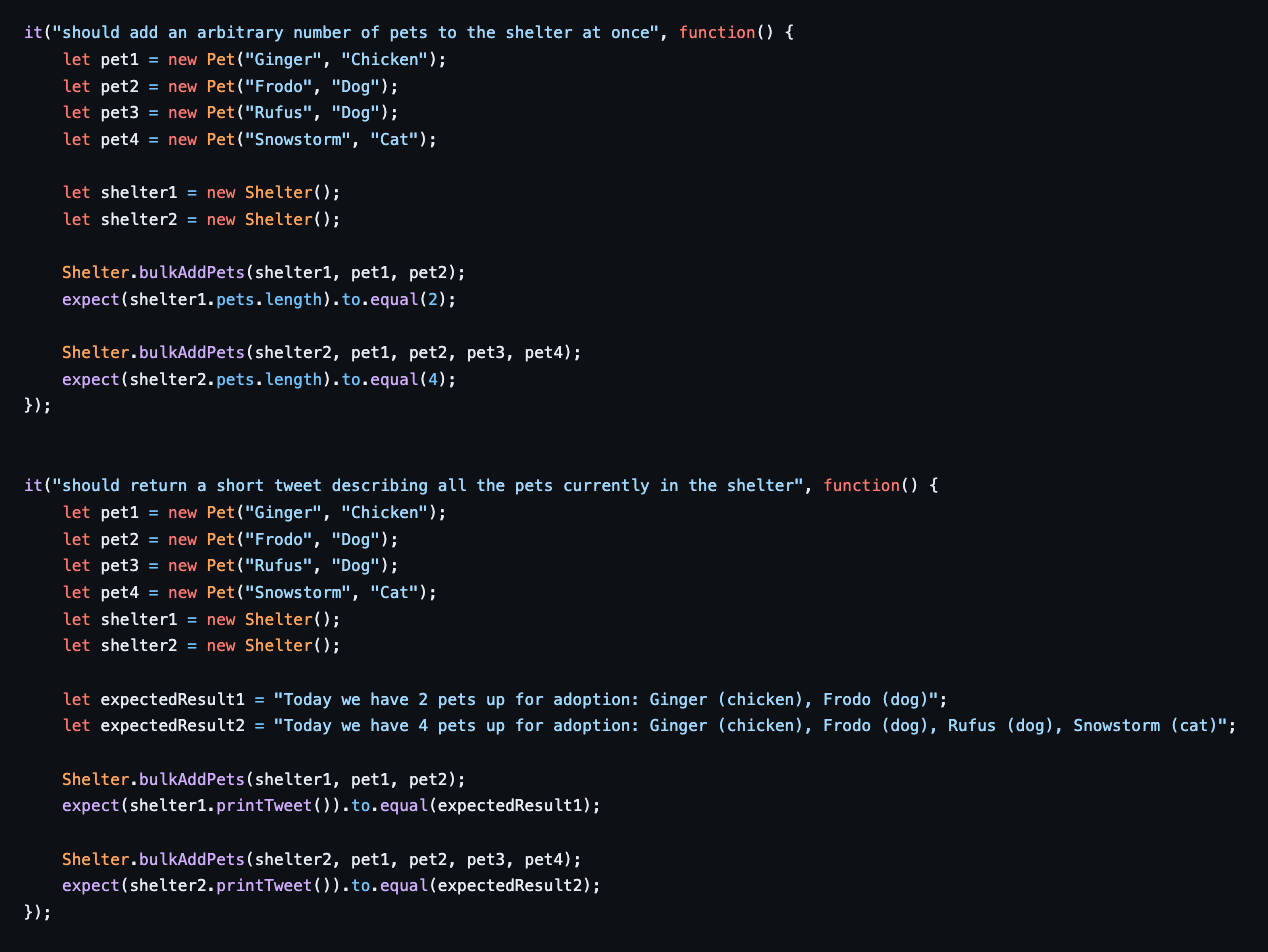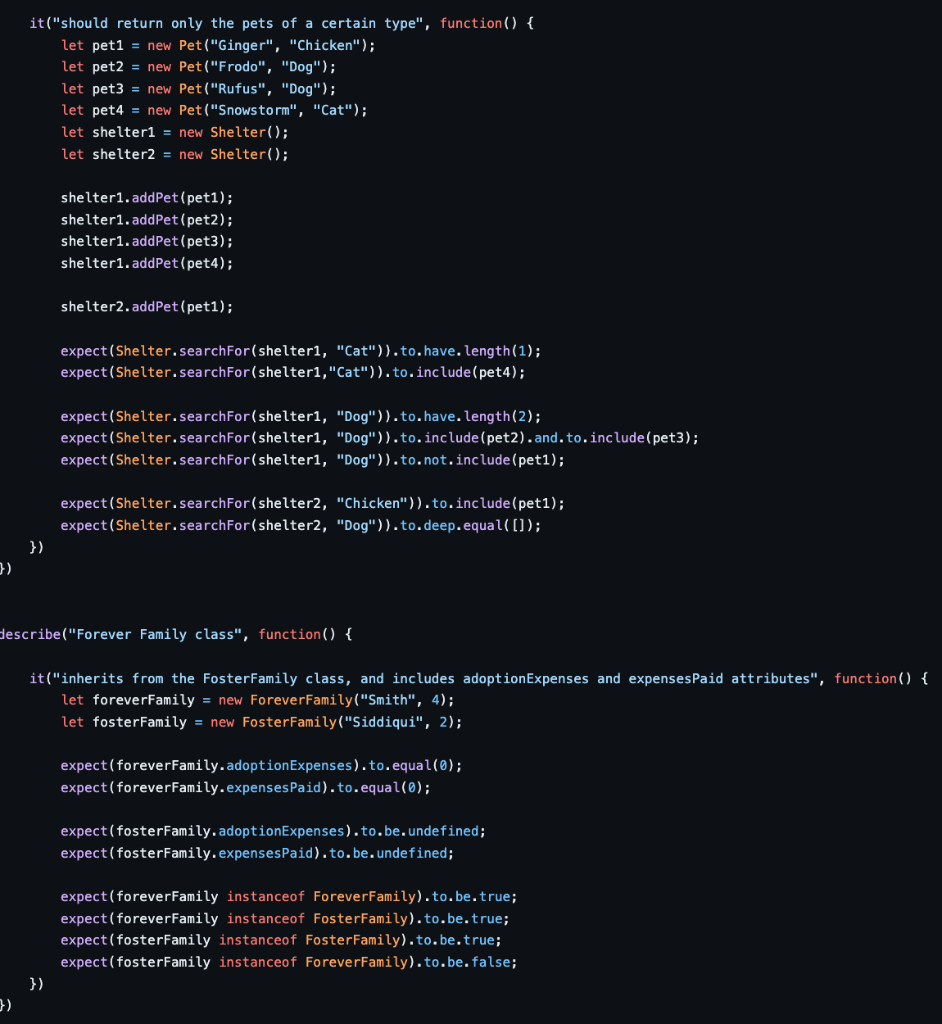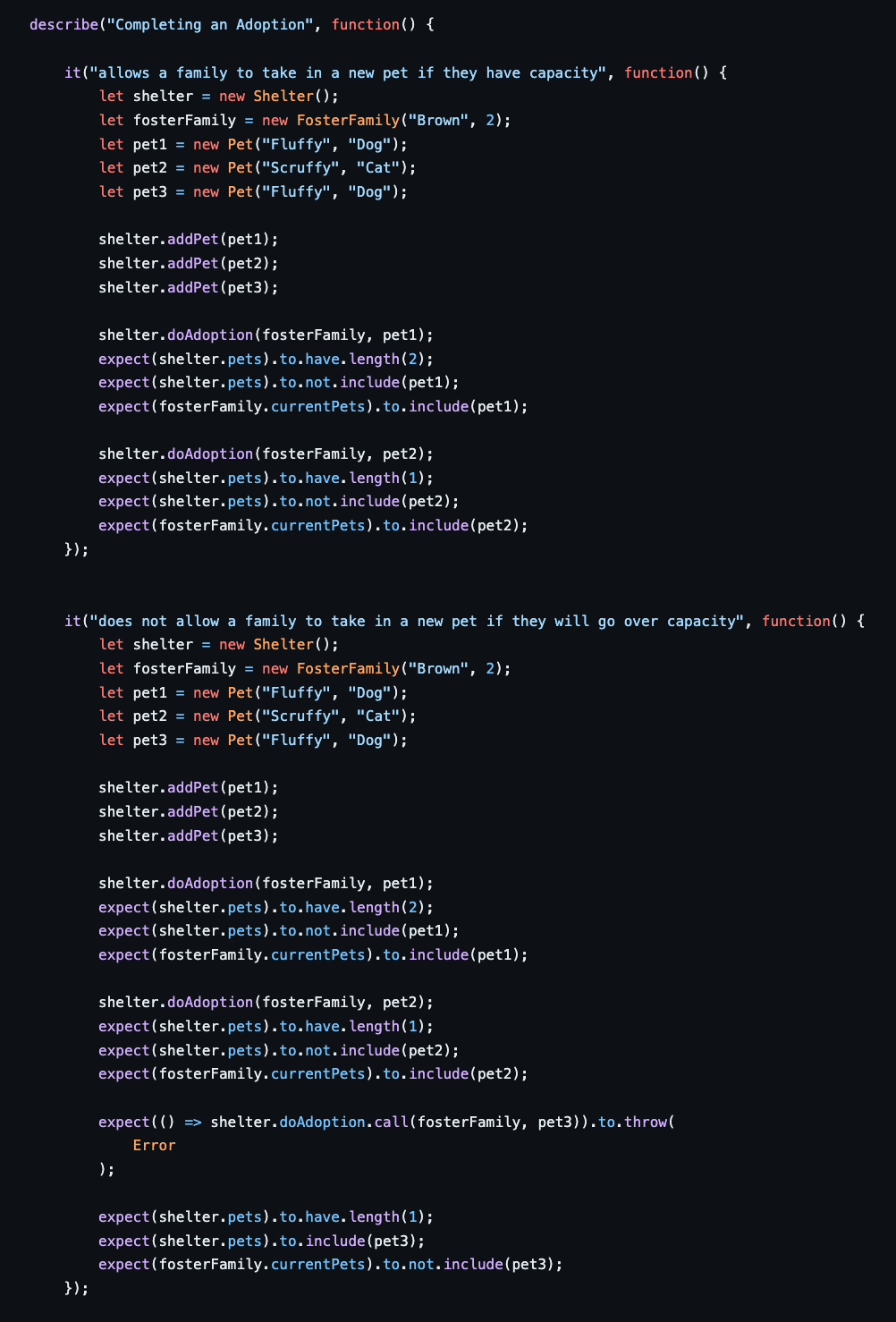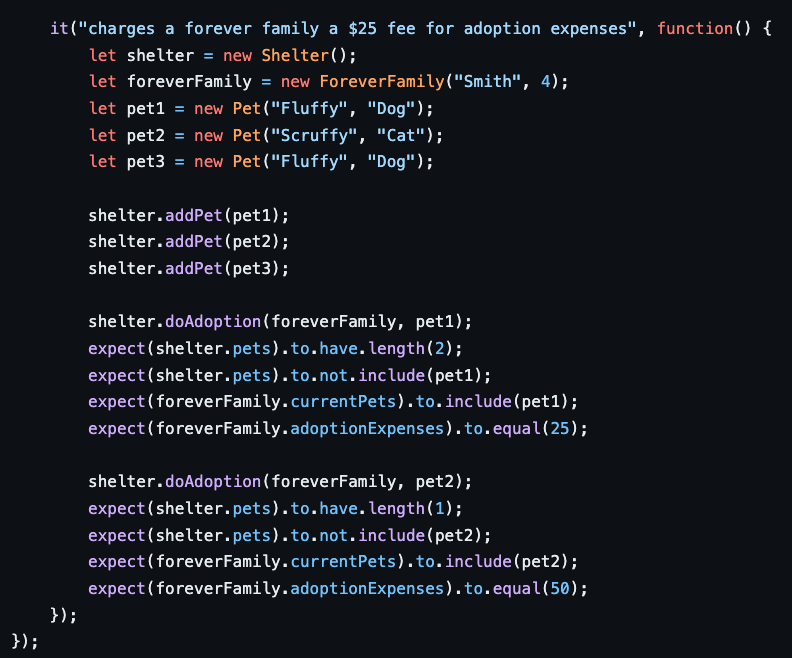Home /
Expert Answers /
Computer Science /
in-this-assessment-you-will-be-implementing-an-animal-shelter-with-pet-adoptions-based-solely-on-te-pa509
(Solved): In this assessment, you will be implementing an animal shelter with pet adoptions based solely on te ...
In this assessment, you will be implementing an animal shelter with pet adoptions based solely on test specs and your TDD/OOP skills.
Make sure to read the specs carefully to understand the requirements and file structure of the project. Everything you need to know is there.
const Pet require("../class/pet.js"); const Shelter = require("../class/shelter.js"); const FosterFamily require("../class/foster-family.j s" ; const ForeverFamily require class/forever-family.; describe("FosterFamily class", function () \{ it("should set last name and pet capacity on creation, and should have past pets and current pets attributes", function () \{ let family1 = new FosterFamily("Smith", 4); let family 2 = new FosterFamily("Brown", 2); expect (family1. lastName) . to. equal("Smith"); expect ( family2. lastName) . to. equal("Brown"); expect ( family1. capacity) . to. equal(4); expect (family2. capacity) . to. equal(2); expect (family1. currentPets) , to. deep. equal( []); expect (family1. pastPets) . to. deep. equal([]); expect ( family2. currentPets) , to. deep. equal( []); expect (family2. pastPets) . to. deep. equal([]); 3); it("should allow foster family to add and remove pets, without going over their capacity", function () \{ let family = new FosterFamily("Brown", 2); let rufus = new Pet("Rufus", "Dog"); let snowstorm = new Pet("Snowstorm", "Cat"); let fluffy = new Pet("Fluffy", "Chicken"); family. addPet ( rufus); expect ( family, currentPets , length) , to. equal(1); family. addPet(snowstorm); expect (family. currentPets . length) . to. equal(2); expect(family. addPet. bind(family, fluffy)) . to. throw(Error); expect (family. currentPets. length) . to. equal(2); family, removePet( rufus); expect (family. currentPets . length) . to. equal(1); expect (family. currentPets) . to. include(snowstorm); expect(family. removePet. bind(family, rufus)). to. throw(Error); 3); 3);
describe("Pet class", function() \{ it("should set name and pet type on creation", function () \{ let rufus = new Pet("Rufus", "Dog"); let snowstorm = new Pet("Snowstorm", "Cat"); expect ( rufus. name) . to. equal("Rufus"); expect (rufus. petType), to. equal("Dog"); expect (snowstorm. name) . to. equal("Snowstorm"); expect (snowstorm. petType) . to. equal("Cat"); 3); it("is only adoptable if it has a name, and is a cat, dog, mouse, chicken, or rabbit", function() \{ let adoptablePet1 = new Pet("Ginger", "Chicken"); let adoptablePet2 = new Pet ("Frodo", "Dog"); let notAdoptablePet1 = new Pet(); let notAdoptablePet2 = new Pet "Joey"); let notAdoptablePet3 = new Pet("Ruby", "Snake"); expect (adoptablePet1. isAdoptable()). to. be. true; expect (adoptablePet2. isAdoptable()). to. be. true; expect (notAdoptablePet1. isAdoptable()). to. be. false; expect (notAdoptablePet2. isAdoptable()). to. be. false; expect (notAdoptablePet3. isAdoptable()). to. be. false; 3) \}); describe("Shelter class", function() \{ it("should allow adoptable pets into the shelter", function() \{ let adoptablePet1 = new Pet("Ginger", "Chicken"); let adoptablePet2 = new Pet("Frodo", "Dog"); let shelter new Shelter(); shelter.addPet (adoptablePet1); expect(shelter.pets. length). to. equal(1); shelter. addPet (adoptablePet2); expect (shelter. pets. length) . to. equal(2); expect (shelter. pets) . to. include(adoptablePet2); 3); it("should not allow non-adoptable pets into the shelter", function() \{ let notAdoptablePet1 = new Pet ("Joey"); let notAdoptablePet2 = new Pet("Ruby", "Snake"); let shelter new Shelter () ; expect (shelter. addPet. bind (shelter, notAdoptablePet1)). to. throw(Error); expect (shelter.addPet.bind(shelter, notAdoptablePet2)). to. throw(Error); 3);
it("should add an arbitrary number of pets to the shelter at once", function() \{ let pet1 = new Pet("Ginger", "Chicken"); let pet2 = new Pet("Frodo", "Dog"); let pet3 = new Pet("Rufus", "Dog"); let pet4 = new Pet("Snowstorm", "Cat"); let shelter1 = new Shelter(); let shelter2 = new Shelter(); Shelter.bulkAddPets (shelter1, pet1, pet2); expect (shelter1. pets. length). to. equal(2); Shelter.bulkAddPets(shelter2, pet1, pet2, pet3, pet4); expect (shelter2. pets. length). to. equal(4); ; it("should return a short tweet describing all the pets currently in the shelter", function() \{ let pet1 = new Pet("Ginger", "Chicken"); let pet2 = new Pet("Frodo", "Dog"); let pet 3 = new Pet("Rufus", "Dog"); let pet4 = new Pet("Snowstorm", "Cat"); let shelter1 = new Shelter(); let shelter2 = new Shelter(); let expectedResult1 = "Today we have 2 pets up for adoption: Ginger (chicken), Frodo (dog)"; let expectedResult2 = "Today we have 4 pets up for adoption: Ginger (chicken), Frodo (dog), Rufus (dog), Snowstorm (cat)"; Shelter.bulkAddPets(shelter1, pet1, pet2); expect(shelter1. printTweet()). to. equal(expectedResult1); Shelter.bulkAddPets(shelter2, pet1, pet2, pet3, pet4); expect (shelter2. printTweet ()) . to. equal (expectedResult2); 3);
it( "should return only the pets of a certain type", function() \{ let pet1 = new Pet("Ginger", "Chicken"); let pet2 = new Pet("Frodo", "Dog"); let pet3 = new Pet("Rufus", "Dog"); let pet4 = new Pet( "Snowstorm", "Cat"); let shelter1 = new Shelter(); let shelter2 = new Shelter(); shelter1. addPet(pet1); shelter1. addPet(pet2); shelter1. addPet (pet3); shelter1. addPet ( pet4); shelter2. addPet(pet1); expect(Shelter. searchFor(shelter1, "Cat")). to. have. length(1); expect(Shelter. searchFor(shelter1, "Cat")). to. inc lude(pet4) ; expect(Shelter.searchFor(shelter1, "Dog")) . to. have. length(2); expect(Shelter. searchFor(shelter1, "Dog")) . to. include(pet2) . and. to. inc lude(pet3); expect(Shelter. searchFor(shelter1, "Dog")). to. not. include(pet1); expect(Shelter. searchFor(shelter2, "Chicken")). to. include(pet1); expect(Shelter.searchFor(shelter2, "Dog")). to. deep. equal( []); 3) escribe("Forever Family class", function() \{ it("inherits from the FosterFamily class, and includes adoptionExpenses and expensesPaid attributes", function() \{ let foreverFamily = new ForeverFamily( "Smith", 4); let fosterFamily = new FosterFamily ("Siddiqui", 2); expect (foreverFamily. adoptionExpenses) . to. equal( ; expect (foreverFamily. expensesPaid) . to. equal(0); expect (fosterFamily, adoptionExpenses) . to. be. undefined; expect (fosterFamily, expensesPaid) , to. be. undefined; expect(foreverFamily instanceof ForeverFamily). to. be.true; expect(foreverFamily instanceof FosterFamily). to.be.true; expect(fosterFamily instanceof FosterFamily), to. be. true; expect(fosterFamily instanceof ForeverFamily). to. be. false; 3)
describe("Completing an Adoption", function() \{ it("allows a family to take in a new pet if they have capacity", function() \{ let shelter new Shelter(); let fosterFamily = new FosterFamily("Brown", 2); let pet1 = new Pet("Fluffy", "Dog"); let pet2 = new Pet("Scruffy", "Cat"); let new Pet("Fluffy", "Dog"); shelter.addPet (pet1); shelter.addPet (pet2); shelter.addPet (pet 3 ); shelter. doAdoption (fosterFamily, pet1); expect (shelter. pets) , to. have. length(2); expect (shelter. pets) . to. not. include(pet1); expect ( fosterFamily. currentPets) . to . include(pet1); shelter. doAdoption (fosterFamily, pet2); expect (shelter. pets). to. have. length(1); expect (shelter. pets) . to. not. include(pet2); expect ( fosterFamily. currentPets) . to. include(pet2); \}) it("does not allow a family to take in a new pet if they will go over capacity", function() \{ let shelter new Shelter(); let fosterFamily = new FosterFamily("Brown", 2); let pet1 = new Pet("Fluffy", "Dog"); let pet2 = new Pet("Scruffy", "Cat"); let new Pet("Fluffy", "Dog"); shelter. addPet (pet1); shelter. addPet ( pet2); shelter. addPet (pet3); shelter. doAdoption (fosterFamily, pet1); expect (shelter. pets) . to. have. length(2); expect (shelter. pets). to. not. include(pet1); expect ( fosterFamily. currentPets). to. include(pet1); shelter. doAdoption (fosterFamily, pet2); expect (shelter. pets). to. have. length(1); expect (shelter. pets) . to. not. include (pet2); expect ( fosterFamily. currentPets) . to. include(pet2); expect shelter. doAdoption. call(fosterFamily, pet3)). to. throw( Error ); expect (shelter. pets) . to. have. length(1); expect (shelter. pets). to. include (pet3); expect ( fosterFamily. currentPets) . to. not. include(pet3); \});
it("charges a forever family a fee for adoption expenses", function() \{ let shelter = new Shelter(); let foreverFamily = new ForeverFamily( "Smith", 4); let pet1 = new Pet("Fluffy", "Dog"); let pet2 = new Pet("Scruffy", "Cat"); let pet 3 = new Pet("Fluffy", "Dog"); shelter.addPet (pet1); shelter.addPet ( pet2); shelter.addPet (pet3); shelter. doAdoption (foreverFamily, pet1); expect (shelter. pets) . to. have. length(2); expect (shelter. pets) . to.not. include (pet1); expect (foreverFamily. currentPets) . to. include (pet1); expect (foreverFamily. adoptionExpenses) . to. equal(25); shelter. doAdoption (foreverFamily, pet2); expect (shelter. pets) . to. have. length(1); expect(shelter. pets) . to. not. include (pet2); expect (foreverFamily. currentPets) . to. include (pet2); expect (foreverFamily. adoptionExpenses) . to. equal(50); \});
Expert Answer
This code was written to test the animal shelter system that allows pets to be adopted. It tests the functionality of three classes: 1)Pet2)ForestFamely3)ShelterThe "Pet" class creates pets with a name and pet type. It also has a method to check if the pet is adoptable.The "FosterFamily" class creates families with a last name and a capacity for pets. It allows pets to be added and removed when the capacity is not exceed.The "Shelter" class allows adoptable pets to be added to the shelter, but does not allow non-adoptable pets to be added.It can also add an arbitrary number of pets to the shelter at once and return a short tweet describing all the pets currently in the shelter.
